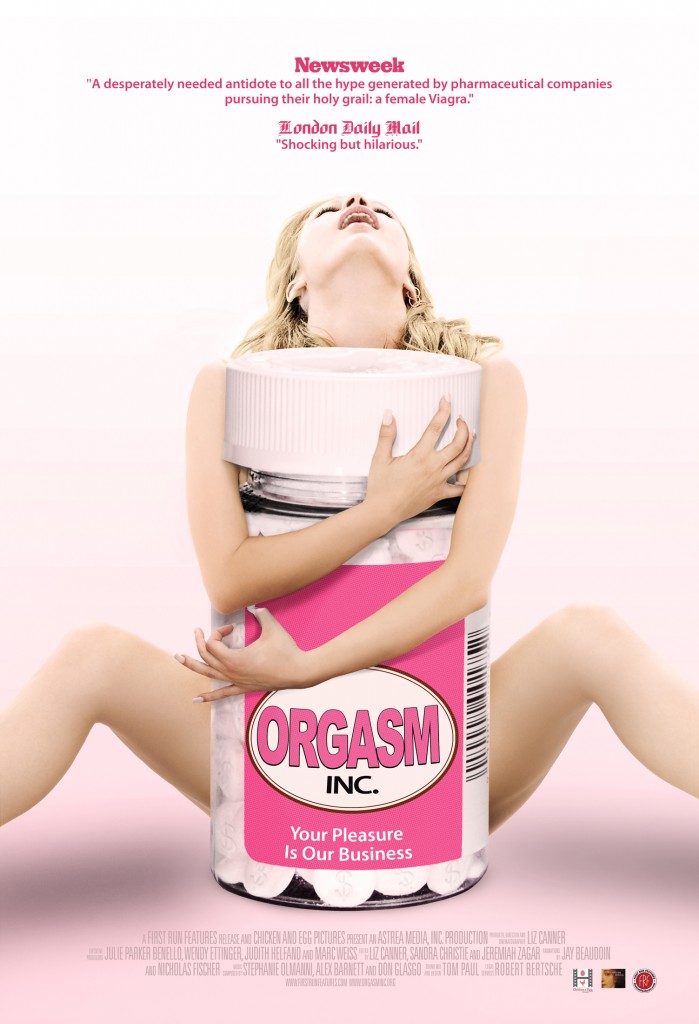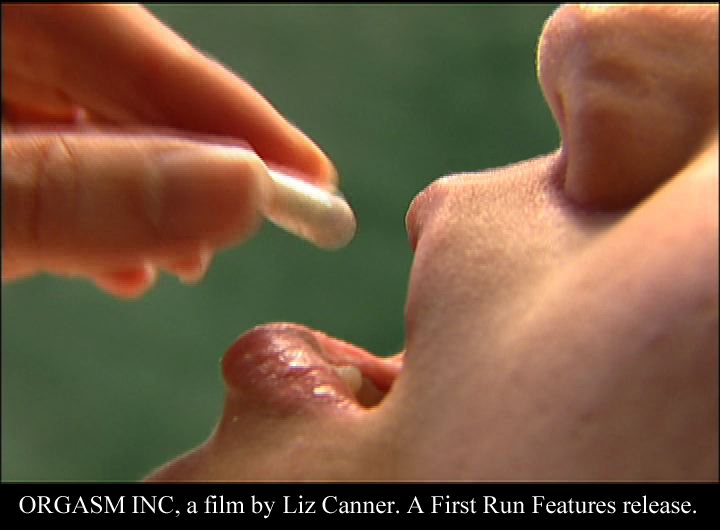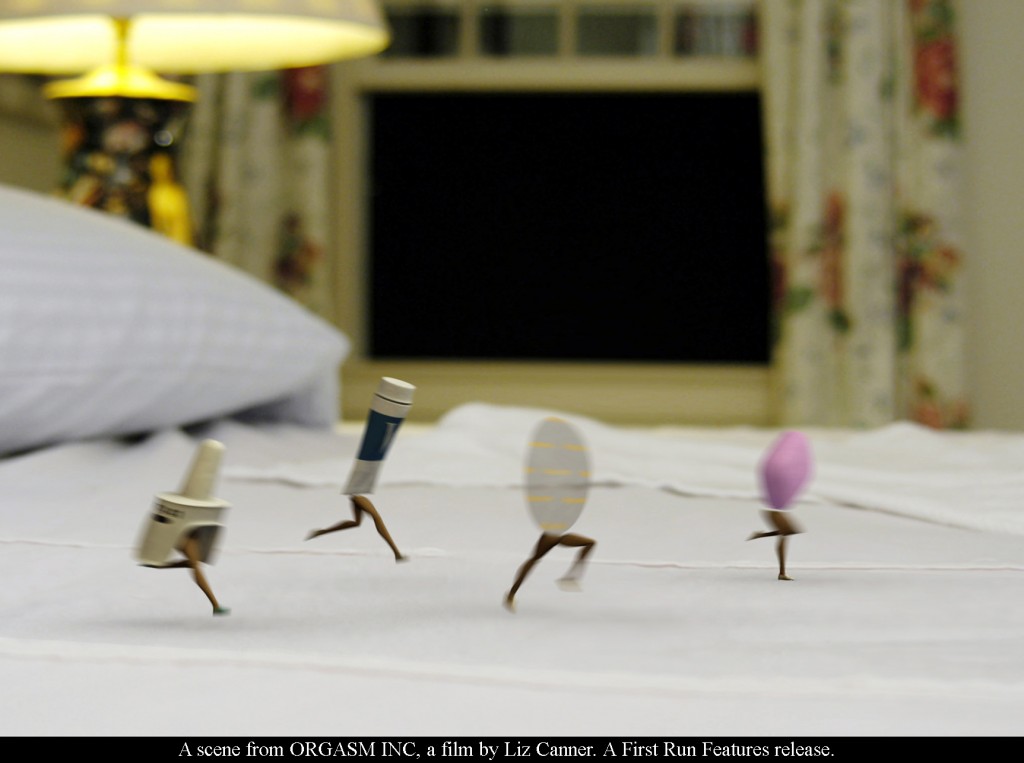Fri 11 Feb 2011
Feeling Groovy
Posted by Ethan under Film Review, NYC Film Critic
Comments Off on Feeling Groovy
Orgasm Inc.
Directed by Elizabeth Canner
***
Nine years in the making, Elizabeth Canner’s eye-catchingly titled documentary Orgasm Inc. is neither a profile of a corporation that specializes in providing orgasms nor an expose of the contemporary porn industry. Rather, this thoughtful—if at times clumsy—film is the latest salvo in the ongoing debate over the increased power of the pharmaceutical industry in shaping our health-care system, a subject that has steadily made its way from the headlines into documentaries and even narrative features (see the recent Love and Other Drugs…well, the first half of it, anyway).
The director herself was initially hired by the drug company Vivus to create erotic videos for the subjects involved in a clinical trial of one of its newest creations—a pill that would do for women what Viagra did for men. Doing her own independent research, Canner learned that her employer’s drug was part of an industry-wide race to find a “cure†for what had been labeled female sexual dysfunction or FSD, which, loosely defined, means an inability for a woman to have and enjoy sex on a regular basis. Investigating further, she found that while the exact origins of this condition were murky, it was apparent that the pharmaceutical companies were more involved in its diagnosis than medical professionals. Why? So, she argues, that they could profit by creating a drug treating a disorder that may not actually exist.
Worse still, some doctors—most notably sisters Laura and Jennifer Berman—worked with the industry to talk up FSD on television and in the news, making it seem like a hot-button disorder that required specialized treatment. In addition to earning hefty fees from the drug companies, the Bermans became medical celebrities a la Dr. Mehmet Oz and eventually open their own center for sexual health, which the director briefly tours on camera. Canner even scores a quick sit-down with Laura Berman herself, but unfortunately she either declined to or was restricted from questioning the good doctor about her industry ties.
The film includes interviews with several women that were told by their doctors that they suffered from FSD and all of them express a certain amount of confusion about what exactly the diagnosis means and the various treatment options they were presented with. Those options ranged from pills that are still undergoing clinical trials, to potentially dangerous cosmetic genital surgery—a field that Canner says has exploded in recent years, with some 200 clinics worldwide—to strange devices like the Orgasmatron, an electrode implanted in the spinal cord. The gadget’s creator, Dr. Stuart Meloy, promises terrific orgasms but declines to mention the possible risk of shock or epidural hemorrhage. (Woody Allen may want to call his lawyers—he foresaw the invention of the Orgasmatron 38 years ago in his futuristic comedy Sleeper.)
As interesting as individual scenes are, Orgasm Inc. suffers somewhat from the lack of a strong narrative throughline. Despite the way the project began, Canner avoids turning the film into a Morgan Spurlock-style first-person journey of self-discovery, which was probably a wise choice, to be honest. Instead, she loosely constructs her trim 78-minute feature around the concept that drug companies are racing to be the first to find that lucrative miracle cure for FSD, an idea she illustrates through a recurring animated segment depicting a group of pills and creams running across a set of bedsheets bound for a finish line. In concept, it’s a funny idea, but the execution is marred by cheap-looking CGI and cutesy high-pitched voiceovers.
It’s also a shame that Canner wasn’t able to land more interviews with people within the industry, not necessarily to give the film “balance” (the bane of a lot of network TV journalism these days) but simply so that she can directly question them about some of the more troubling information she turns up in her research. One of the movie’s best scenes, for example, finds Canner speaking with a middle-aged female marketing rep at a sexology trade show who is there pitching attendees on laser vaginal rejuvenation and designer laser vaginoplasty. The descriptions she offers of both surgical procedures sound as painful as their names suggest. Under the director’s gentle (almost too much so) questioning, the woman eventually abandons her standard sales pitch and admits to having mixed feelings about the services her company is offering. “I might have to ask for the tape back,” she says, half-jokingly. “At least give me enough time to find a new job before you air this.” That’s the kind of moment the film needs more of, where the people pushing FSD and its accompanying treatments are really challenged to defend what it is they do, in the same way that Charles Ferguson’s recent documentary Inside Job puts a number of prominent economists and legislators on the spot over their role in the ongoing financial crisis. (To be fair to Canner, it’s difficult for even established journalists to land interviews with high-ranking Big Pharma execs, so an independent documentary filmmaker has very little chance of successfully wrangling a one-on-one.)
Orgasm Inc. does build to a–sorry–climax of sorts, devoting its last 20 minutes to the run-up to an FDA hearing that will determine whether Proctor & Gamble, perhaps the world’s biggest drug company, is able to move forward with manufacturing and marketing a testosterone patch for women that suffer from FSD. Leading the charge against the patch is NYU professor and psychologist Dr. Leonore Tiefer, who delivers a strong critique of the drug in front of the panel. Thanks in part to her efforts, P&G loses the day, only to score a significant victory not long after when the patch is approved for sale in the European Union. It would be wrong to come away from this movie convinced that the entire pharmaceutical industry is corrupt and profit-minded, but Orgasm Inc. does show that drug giants may sometimes confuse what’s best for the patient with what’s best for their bottom line.
Orgasm Inc. opens today at New York’s Quad City cinemas.




No Responses to “ Feeling Groovy ”
Sorry, comments for this entry are closed at this time.